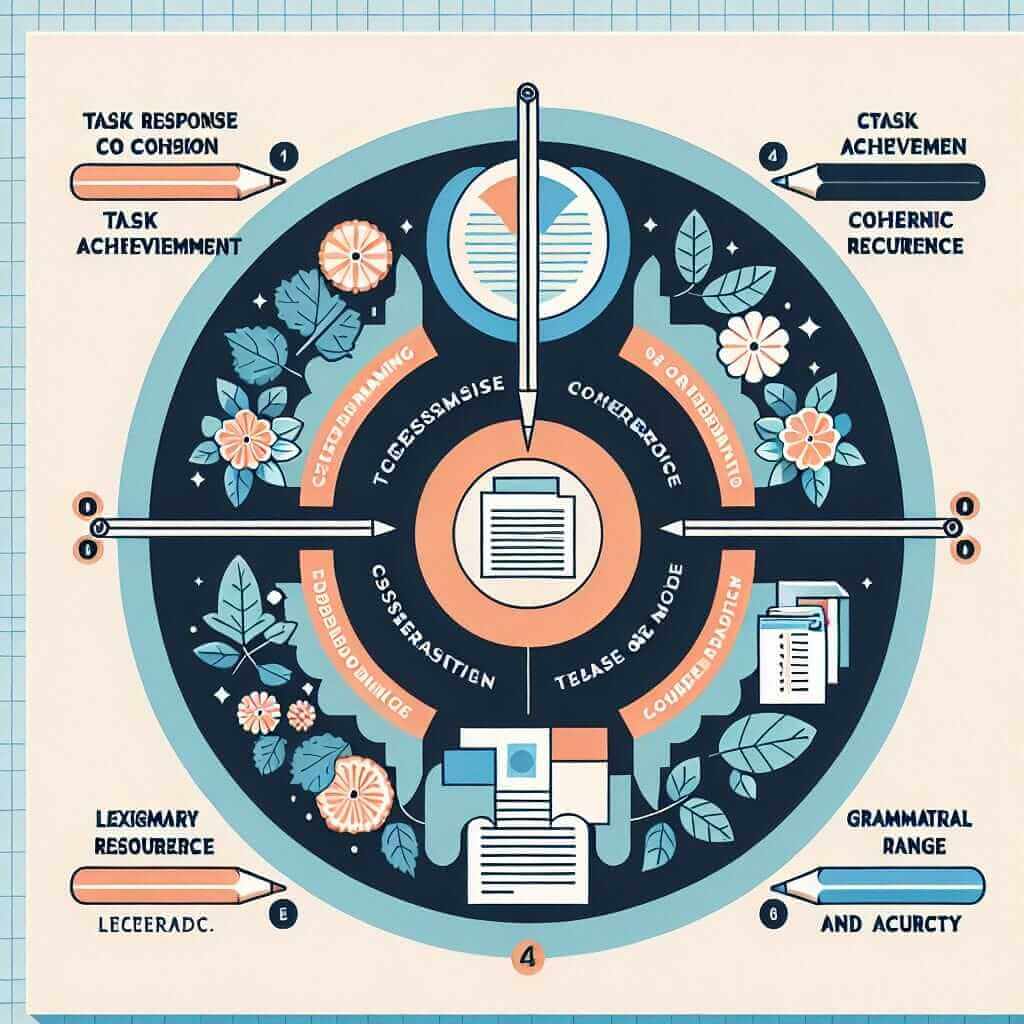As an IELTS instructor with over two decades of experience, I’ve seen firsthand the hopes and dreams riding on this high-stakes exam. For many aspiring students, the writing section can feel like a particularly daunting hurdle. Understanding how your writing is evaluated is crucial to achieving your desired band score. So, let’s demystify the marking process and equip you with the knowledge to conquer the IELTS writing tasks.
The Four Pillars of IELTS Writing Assessment
The IELTS writing test, encompassing both Task 1 (report writing) and Task 2 (essay writing), is assessed based on four key criteria:
1. Task Response/Task Achievement
This criterion assesses how effectively you have addressed the task requirements.
- For Task 1: This means accurately summarizing and highlighting key features of visual data (graphs, charts, diagrams) in a clear and organized manner.
- For Task 2: You need to directly address the essay prompt, present a well-developed position, and support your arguments with relevant examples and evidence.
2. Coherence and Cohesion
This criterion evaluates the clarity and flow of your writing.
- Coherence refers to the logical organization of your ideas. Your writing should follow a clear structure with a logical progression of thought.
- Cohesion focuses on how smoothly your ideas are linked together using appropriate linking words (e.g., however, furthermore, in contrast) and cohesive devices (e.g., pronouns, synonyms).
3. Lexical Resource
This criterion assesses the range and accuracy of your vocabulary. Examiners look for:
- Variety: Using a wide range of vocabulary relevant to the topic.
- Precision: Choosing words that convey your meaning precisely.
- Collocations: Using words in their natural combinations (e.g., “heavy rain” instead of “strong rain”).
- Avoiding errors: Using vocabulary correctly and avoiding informal language.
4. Grammatical Range and Accuracy
This criterion evaluates your ability to use a variety of grammatical structures accurately. Examiners assess:
- Sentence structure: Using a mix of simple, compound, and complex sentences.
- Tenses: Using the correct tenses consistently and appropriately.
- Punctuation: Using punctuation accurately to enhance meaning.

Example: Applying the Criteria
Let’s consider a Task 2 essay prompt:
“Some people believe that technology has made our lives easier. Others argue that it has made our lives more complex. Discuss both views and give your own opinion.”
A high-scoring essay would:
- Task Response: Clearly address both sides of the argument and present a well-supported opinion.
- Coherence and Cohesion: Follow a logical structure (e.g., introduction, body paragraphs discussing each view, conclusion) and use linking words to connect ideas.
- Lexical Resource: Employ a wide range of vocabulary related to technology and its impact on society (e.g., automation, innovation, connectivity, dependence).
- Grammatical Range and Accuracy: Showcase a variety of sentence structures and grammatical features with a high degree of accuracy.
Tips to Maximize Your Writing Score
Here are some valuable insights from my years of experience:
- Understand the band descriptors: Familiarize yourself with the official IELTS writing band descriptors. These descriptors outline the specific criteria for each band score, providing clear benchmarks for your writing.
- Plan your writing: Don’t rush into writing. Take time to brainstorm ideas and structure your response. A well-organized essay is easier to read and understand.
- Practice makes perfect: Regular practice is essential. Write essays and reports on a variety of topics, and seek feedback from experienced IELTS instructors.
- Proofread carefully: Leave time to proofread your work for grammatical errors, spelling mistakes, and clarity.
Conclusion
Remember, achieving a high IELTS writing score requires a combination of language proficiency, critical thinking skills, and exam strategy. By understanding how your writing is assessed and implementing the tips outlined above, you’ll be well on your way to success. Good luck!